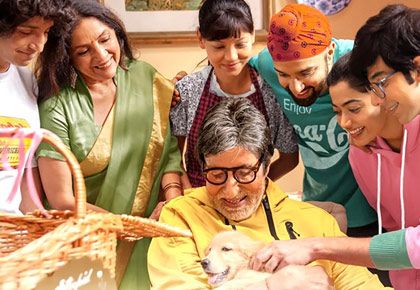Goodbye makes ordinary places, ordinary people and ordinary events become interesting, observes Mayur Sanap.

Film-makers love to see the excruciating beauty in human grief.
Using the backdrop of a sombre occasion like a funeral as a framing device to explore the family dynamics is perhaps developing into a sub-genre of its own in the Hindi film industry.
Earlier last year, we saw two strikingly similar films in a quick succession, Seema Pahwa's Ramprasad Ki Tehrvi and Umesh Bisht's Pagglait.
Both sublime.
While the nature of the tragedy was different, these films provided an insight on various ways loss is processed.
We have certainly seen variations of the characters in such coming-of-age narratives with an event like a family funeral taking the centrestage. Somehow, though, in writer-director Vikas Bahl's Goodbye, the formulaic premise surprisingly works. Yet again.
Goodbye sets out a framework for family dramedy as the dysfunctional Bhalla clan gets together for mourning after the family matriarch (Neena Gupta)'s sudden demise.
The old man of the house, Harish Bhalla (Amitabh Bachchan), struggles to send word to his scattered family, while coming to terms with the untimely passing of his beloved wife.
The estranged siblings, who seemingly had little contact with each other prior to their mother's death, land at their Chandigarh home for the mourning.
We meet Tara (Rashmika Mandanna), a Mumbai-based lawyer whose Muslim live-in boyfriend is tut-tutted over by her father; Karan (Pavail Gulati), whose life is entangled in incessant work meetings and deadlines, arrives from the US with his guileless wife (Elli AvrRam); turban-clad Angad (Sahil Mehta), who is an adopted son to the family, make it just in time for the sombre occasion.
As they all come together under one roof, bottled up emotions and uncomfortable conversations unearth.
The premise instantly reminded me of a British dark comedy Death at A Funeral(2007) and also the Shawn Levy-directorial This Is Where I Leave You (2014).
The stereotypical series of events that follow at occasions like this has a tendency to bring the idiosyncrasies of human nature at the forefront.
It holds especially true in the Indian context, and this is perhaps a reason for Bollywood's continued fascination with the subject.
Goodbye starts light, introducing the characters.
It starts building the storyline, and gradually, the ironical humour in the situation and the camaraderie between the characters become more fluent.
The script packs a lot of authentic emotions while rendering a narrative of loss, grief and broken relationships that also paints a riveting portrait of the frayed father-daughter equation.
In two separate instances, both Harish and Tara are seen pontificating about 'mastery in argument'.
When the two get at loggerheads on the simplest family matters, you know there is no winning here.
While it is interesting to watch how every family member has their own unique traits, none of their characters, other than that of Bachchan, has a fully-realised arc.
For example, it is not quite clear why Tara distanced herself from the family after moving to Mumbai, especially from her mother, who was so supportive towards her.
The bonding of the siblings also plays out at a very superficial, sanitised level, giving us a very vague idea of their equation with each other.
Somewhere in its two hour-24 minutes runtime, Goodbye gradually transforms into well-considered, emotionally resonant fare that Bahl crafts with tenderness and empathy.
The film-maker, whose most compelling work was in Queen nine years ao, struggled to spin the same magic with his last outing, the middling 2019 release, Super 30.
As a screwball comedy, while Queen was immensely warm and winsome, Super 30 was a bloated, insipid, biography of a mathematician, marred by dramatic overkill.
Here, Bahl is focused on the steady development of the story and characters with no indulgence into unnecessary frills.
He mostly succeeds at establishing this unwonted cinematic style that is engrossing to say the least. Sometimes sappy and sometimes amusing, but never over the top, the film becomes as heartwarming as it is heartbreaking.
In a nicely staged animated flashback sequence, we see the genesis of Harish and Gayatri's courtship as he harks back to the flippant days in the past.
Gayatri, as he describes her, was a heartthrob of all of Chandigarh and way 'out of his league' only to woo her ultimately.
It's the sum of their banter with each other and a sense of a well-lived history between them that provide the necessary weight to the drama.
In a particularly poignant scene, Harish weepingly talks to Gayatri's ash-urn at the Ganga ghat while his kids look fixedly at him. It's been years since Bachchan was seen this vulnerable on screen. In this very moment, his Harish is achingly sad and unfeigned, riven with grief and emotion.
Marking her Bollywood debut, Rashmika gets into the skin of her character with effortless charm.
Her slightly hammy Hindi aside, she delivers a cogent performance as non-conformist kooky.
Watch her expression in a scene when she is first hit with the news of the tragedy. The shock, the sorrow, the regret -- everything is well-encapsulated in a terrific emotional outburst.
Her Tara might be an ordinary middle-class girl, but she has a sense of identity and dreams of her own.
As she navigates her way through baffling paradoxes of cremation rituals, Tara is schooled by her elder brother to 'just follow what's been told' only to turn around at him to ask 'Why?'
Rashmika plays this character with great zeal with a right amount of restraint whenever it's required.
The film makes ordinary places, ordinary people and ordinary events become interesting.
It is mainly due to the way Bahl cleverly and carefully blends everything.
While the bitter truths about life and family relations are portrayed with empathetic lens, the film also reflects the morbid nature of death from a surprisingly wise standpoint.
In the film's best moments, we have Sunil Grover as an enigmatic panditji, who helps the family learn about the funeral rituals. He brings warmth as well as a certain comic snappiness to the goings-on.
The other actors, rounding off the supporting cast, are equally adept.
While the material might have been a little trite, the film skates by on the likability of its cast that renders stirring performances all around.
The ease with which Neena Gupta depicts her freewheeling character, is a treat to watch.
Short length notwithstanding, her joyous Gayatri is felt throughout the film.
Ashish Vidyarthi's delicious portrayal of an uppity uncle at the family gathering is as hilarious as it is repulsive.
Both Pavail Gulati and Sahil Mehta get their moments to shine.
The cast elevates whatever weaknesses there are in the material.
The music is what you can expect from an Amit Trivedi album.
The score enhances in the background instead of arguing with the dialogue.
The songs, especially Chann Pardesi and Maaye, are melodious and distinctive with introspective lyrics.
Another song Jaikal Mahakal, which plays out as the film reaches its denouement, is splendid.
Sudhakar Reddy Yakkanti (of Sairat fame) lends an unostentatious camerawork that enlivens the proceedings with deftly composed frames.
Goodbye is embedded with solid emotional moments, a few chuckles and some nice ponderings upon life, love and everything inbetween.
With its heart in the right place, the film is perfectly efficient and likable in both jerking tears and soliciting laughs.











